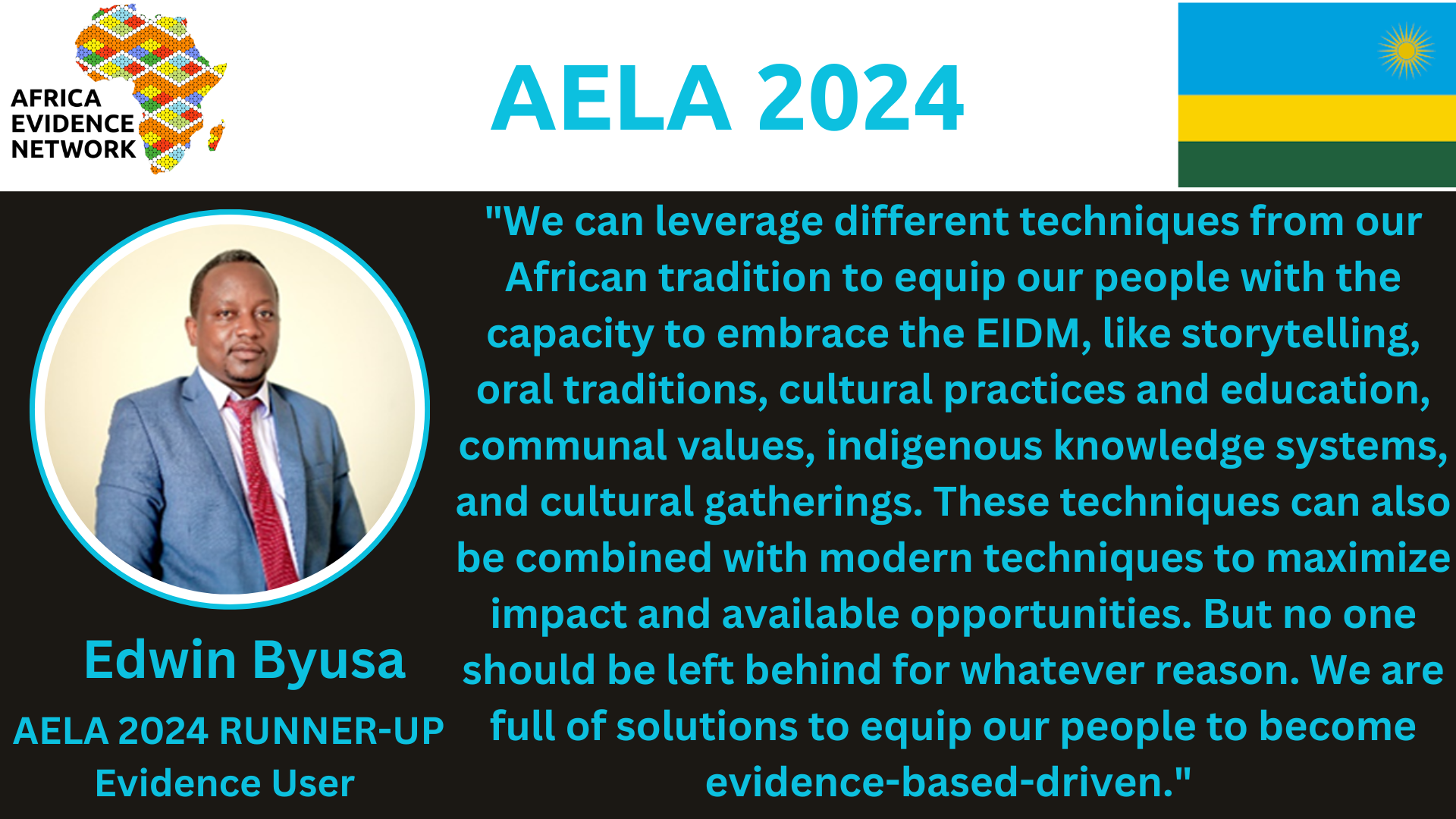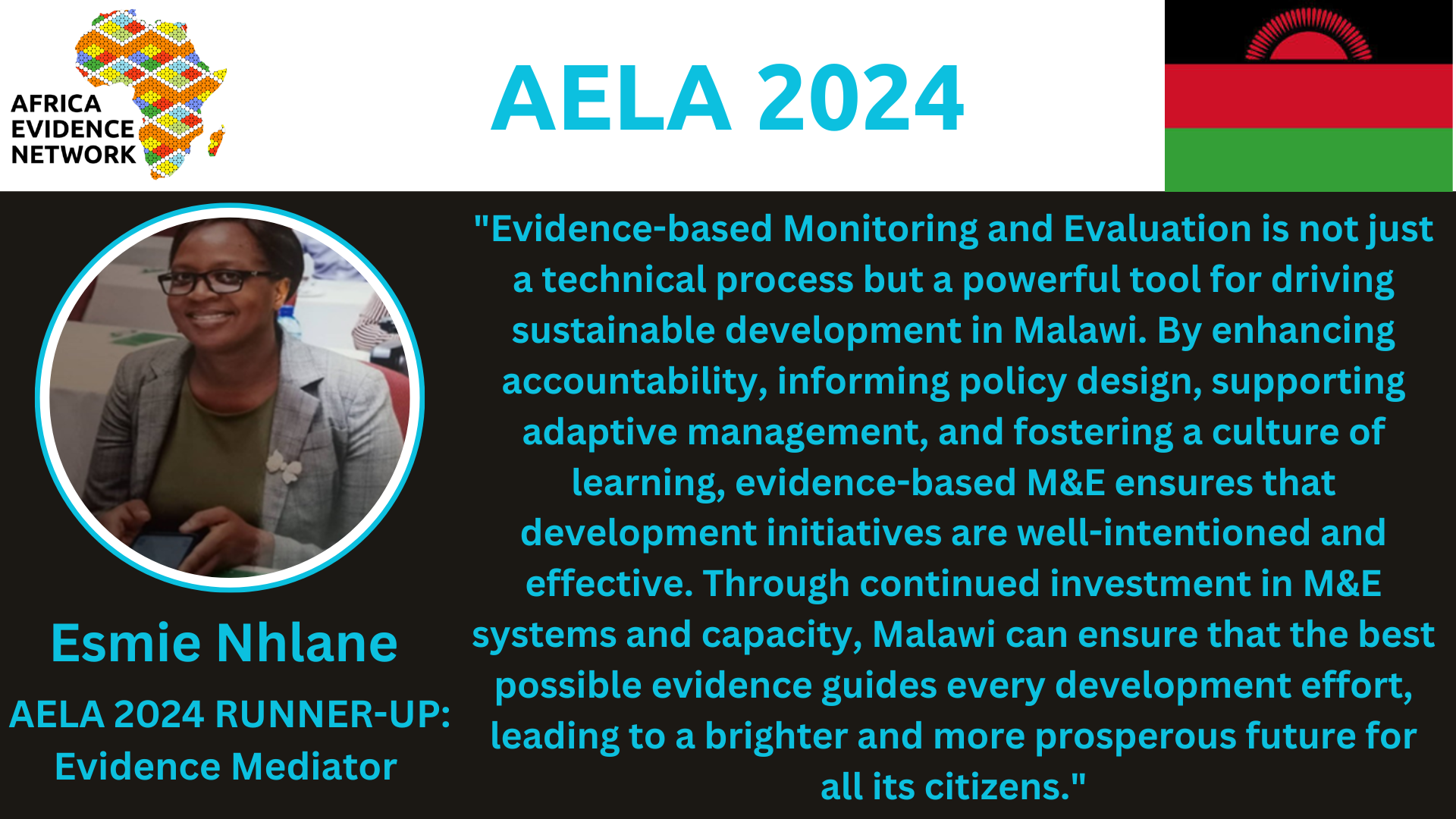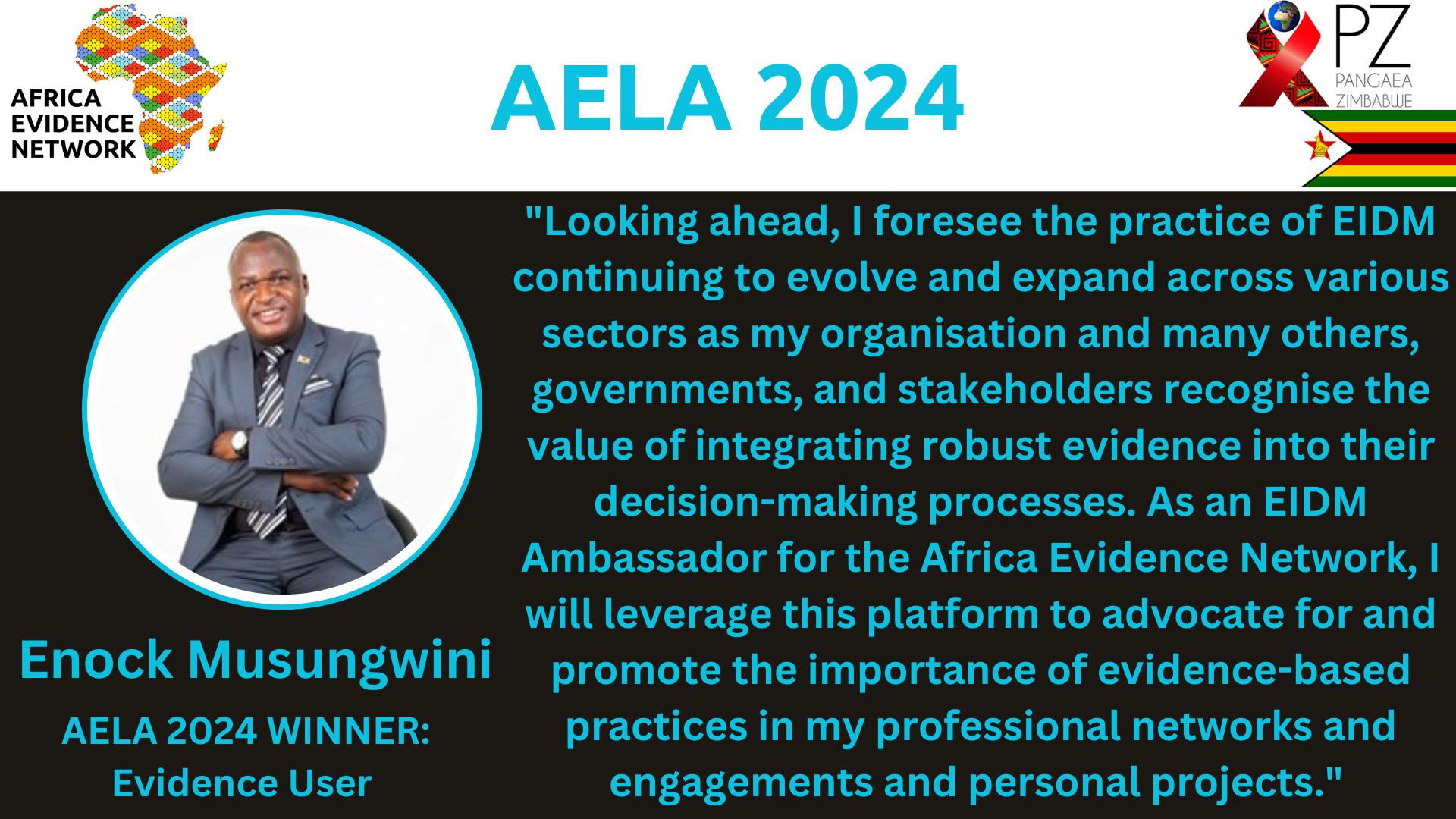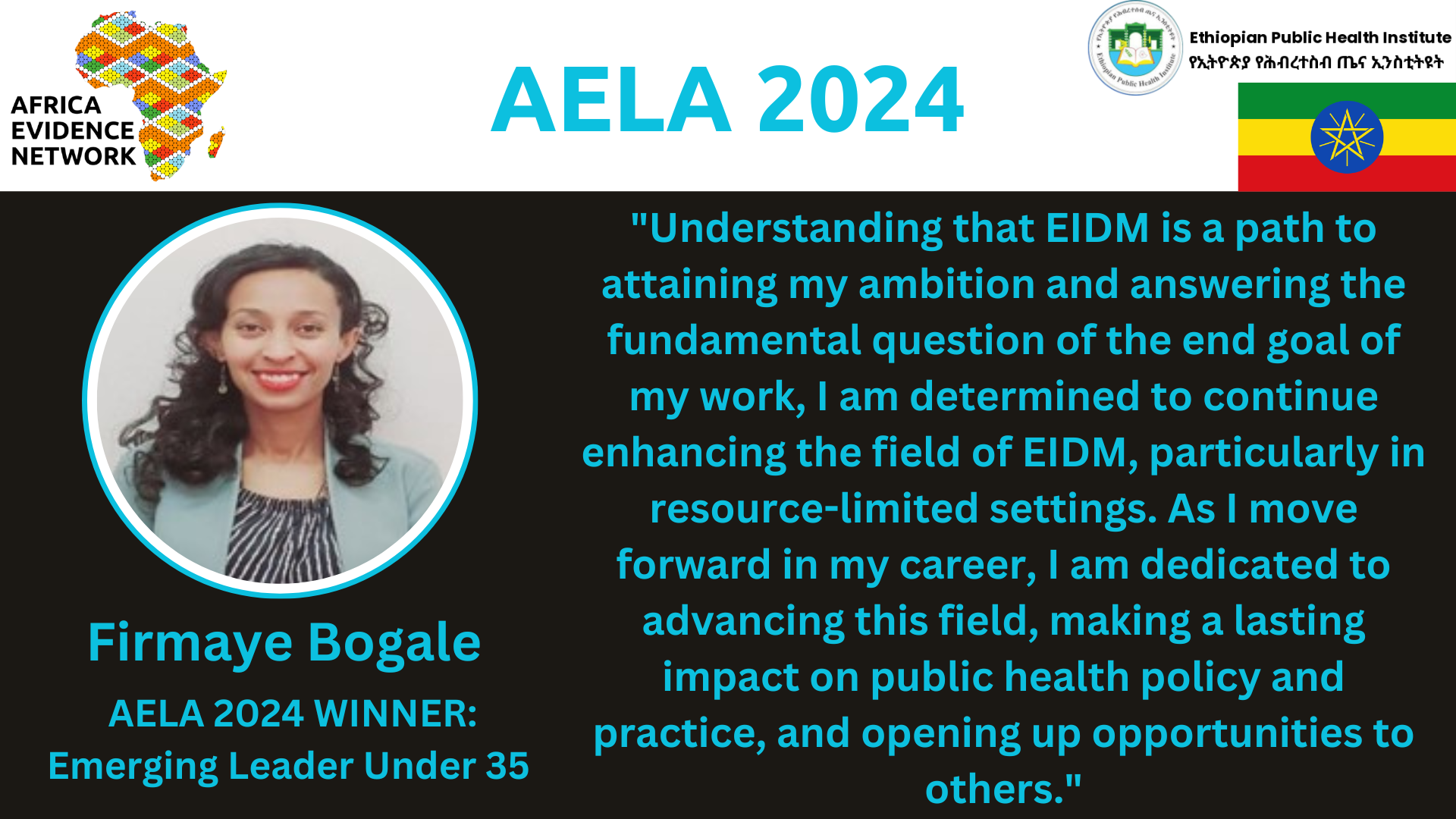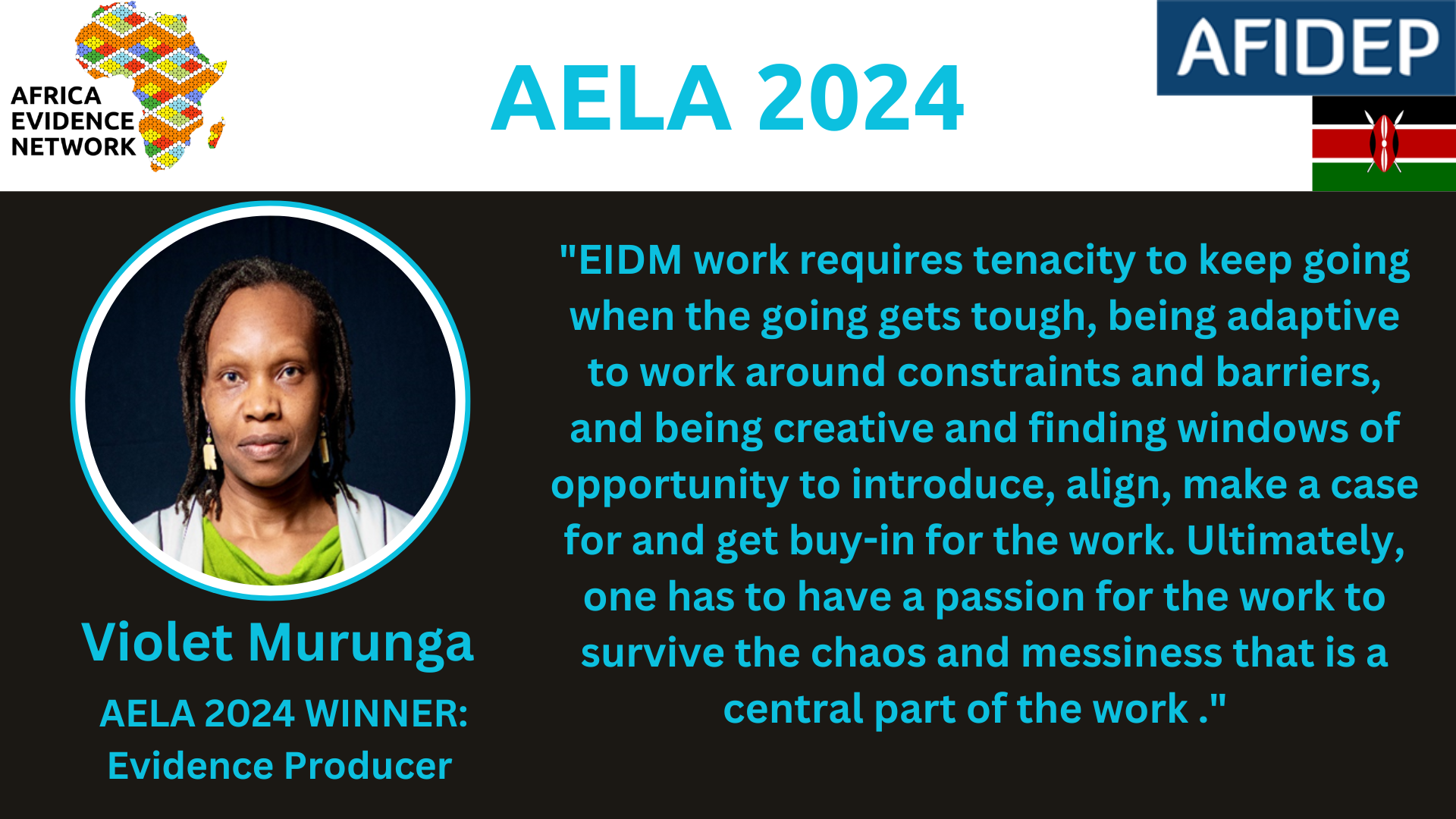
Violet Murunga is the recipient of the Africa Evidence Leadership Award 2024 in the Evidence Producer category offered by the Africa Evidence Network. We asked Violet to reflect on her work.
Transition from Public Health to EIDM
I am Violet Murunga, a proud member of the EIDM community who is still learning and honing the craft. My journey to this career has been interesting, as it is concerned with ensuring the best available data and research inform priorities and solutions for addressing societal problems or evidence-informed decision-making (EIDM). After completing my Master of Public Health in the United States (US), I started my career as a public health professional in the US and later in Kenya before joining the African Institute for Development Policy (AFIDEP) in Kenya in 2011. AFIDEP was founded by African researchers who noted that useful knowledge on issues affecting the African continent was being generated, including from research, but its use by decision-makers to identify priorities and solutions to problems and allocate scarce resources was ad-hoc at best. I was attracted to AFIDEP because of its focus on championing and supporting African governments in consistently accessing, analysing, and synthesising the data and research they need to inform their decisions. Unbeknownst to me, until I learned about AFIDEP and its core mandate, this was a shared desire, which quickly morphed into my professional passion.
Evolving within EIDM
When I joined AFIDEP, it was only 6 months old and one of the few African institutions at the forefront of strengthening the translation of evidence into action in public policy and practice settings. I was among the institute's first technical staff cohort to venture into this niche field. Consequently, the trajectory of my EIDM career evolved with that of the institute and the mentorship and opportunities provided by the leadership. Initially, my work focused on informing government and inter-government reproductive health policy discussions and decisions through packaging, presenting analysis, and synthesising existing data and research from various sources. Over time, my work has expanded to include systems strengthening through capacity development aimed at embedding EIDM capacity within the evidence ecosystem (producers, translators and users) for sustainability, contributing to building the EIDM knowledge base through documenting, sharing and publishing experiences and lessons, and most recently, explicitly integrating gender equity and inclusion in EIDM processes. During my EIDM career, I also attained my PhD, which generated and contributed knowledge to the EIDM field for advancing leadership, investments and capacity for Knowledge Translation in research consortia and their home institutions and country contexts.
EIDM Big Wins
I have helped design, led and supported a wide range of EIDM projects, including EIDM landscape and political economy analyses and case studies, EIDM capacity strengthening projects targeting Ministries of Health, Parliaments, and research institutions and consortia, evaluations of EIDM initiatives, and research impact studies. One career achievement I am most proud of was the result of a project I led between 2013 and 2017, which improved national and sub-national performance monitoring of the sexual and reproductive health programme for adolescents (10-19 years), including contraceptive, pregnancy and post-abortion services, and pregnancy-related deaths. Responding to a specific request from the Kenya Ministry of Health Division of Reproductive and Maternal Health, the project - enSURE Adolescent Sexual and Reproductive Health - supported the adolescent age disaggregation of reproductive and maternal health indicators reported in the Kenya Health Information Systems (KHIS). The KHIS is a critical health sector management tool because the data fed into it is analysed and discussed every quarter to track performance and inform investment decisions.
From EIDM to Equity in EIDM
Among the EIDM projects I am currently leading, two support African countries to realise the SDG aspiration, Leave No One Behind. Both explicitly address gender equity and inclusion in EIDM processes – a unique feature in the field. One project is generating knowledge to inform projects for strengthening the gender data generation, translation and use ecosystem in Senegal and Ethiopia and an Africa-wide agenda for informing investments in gender data strengthening on the continent. The second is a capacity-strengthening project that is part of the Learning Together to Advance Evidence and Equity in Policymaking to achieve the SDGs (LEEPS) partnership. LEEPS supports African countries in accelerating the achievement of SDGs by championing EIDM and equity considerations in decision-making, strengthening the EIDM and gender equity and inclusion capacity of the evidence ecosystem, and fostering learning. The project is first prioritising the reproductive health and clean energy sectors in Kenya and Nigeria in its first phase, ending in late 2025, with plans to expand to other sectors and countries. Various activities are being implemented to achieve the project goal and outcomes, including training policymakers and researchers, strengthening EIDM structures and mechanisms within government institutions, supporting evidence use in government policy and programme review and development and facilitating national and regional EIDM discourses and networking. Monitoring, evaluation, and learning activities have been embedded into the project to generate knowledge for continuous learning.
EIDM Career Survival Tips
I could say a lot more about my work and other achievements that are not mentioned here. However, I would like to end by stating that EIDM work is exciting if you are up for the challenges that come with it. This work is about changing behaviour and culture at individual, organisational and systems levels, which is not easy, as others who do similar work are well aware of. It is even more difficult when your primary target audience is policymakers and the political class. EIDM work requires tenacity to keep going when the going gets tough, being adaptive to work around constraints and barriers, and being creative and finding windows of opportunity to introduce, align, make a case for and get buy-in for the work. Ultimately, one has to have a passion for the work to survive the chaos and messiness that is a central part of the work.
About the author: Violet Murunga is a Research and Policy Analyst at the African Institute for Development Policy (AFIDEP), where she has been since 2011. Violet has over 15 years in public health research and practice including championing and strengthening capacity for knowledge translation (KT) and evidence-informed decision-making (EIDM) in Africa and globally. Violet has expertise in designing, managing, monitoring and evaluating KT and EIDM projects, conducting policy analyses, political economy analyses, research impact assessments and systematic rapid reviews, packaging and communicating evidence using various policy and media engagement strategies including organising dialogues and evidence-based advocacy and strengthening the KT and EIDM capacity of policymakers, researchers, civil society organisations, media and their institutions.
Violet leads/has led a wide range of KT/EIDM projects/ activities including assessments of EIDM contexts (Gender data and decision-making project), EIDM capacity strengthening projects targeting Ministries of Health, Parliaments and research institutions in Kenya, Malawi and Uganda and also research consortia (e.g., in partnership with LSTM) and evaluating EIDM initiatives/ research impact studies (SECURE Health, HIGH-Res projects and Global Challenges Research Fund).
Violet is currently leading the EIDM capacity strengthening project Learning Together to Advance Evidence and Equity in Policymaking to achieve the SDGs (LEEPS). The project is championing and strengthening capacity for KT and EIDM among policymakers, researchers and other key actors in reproductive health and clean energy sectors at country level (in Kenya and Nigeria) and through regional networks and convenings. The project is also explicitly integrating gender equity and inclusion concepts and tools in KT and EIDM processes and capacity strengthening.
Her work through the project enSURE Adolescent Sexual and Reproductive Health (2013-2017), co-created with the Kenya Ministry of Health Division of Reproductive Health, improved performance monitoring of and policies, actions and investments addressing adolescent (10-19 years) contraceptive, pregnancy and post abortion services and pregnancy related deaths at national and sub-national level. The project supported adolescent age disaggregation of reproductive and maternal health indicators reported in the Kenya health information systems (KHIS); rolled out in 2016. The project also produced county adolescent sexual and reproductive health factsheets that were used to contextualise the 2015 Kenya National ASRH policy into county ASRH strategies.
Violet has contributed to KT/EIDM discourse and the growth of the KT/EIDM field in Africa and globally. Her PhD (2022) generated evidence on how the interplay between individual, institutional and systems level factors shape the knowledge translation capacity and practice of researchers in Africa. She has published papers focusing on LMIC researchers’ KT capacity, practice, and support; factors influencing family planning decisions; factors influencing research uptake and policy implementation. She has also participated and served on various committees, working groups, and panels including the expert committee that is advising the UKCDR Research Excellence Framework 2021 (REF 2021) evaluation and Abstract Review Committee for the 2018 and 2023 Africa Evidence Network Conferences. Violet holds a Ph.D. (Research Uptake) from the University of Liverpool, UK, a Master of Public Health (Epidemiology) from Florida International University, US and a Bachelor of Science (Biotechnology) from the University of Newcastle, Australia.
Acknowledgements: The author(s) is solely responsible for the content of this article, including all errors or omissions; acknowledgements do not imply endorsement of the content. The author is grateful to Charity Chisoro for her guidance in preparing and finalising this article, as well as her editorial support.
Disclaimer: The views expressed in published blog posts, as well as any errors or omissions, are the sole responsibility of the author/s and do not represent the views of the Africa Evidence Network, its secretariat, advisory or reference groups, or its funders; nor does it imply endorsement by the afore-mentioned parties.
Suggested citation: Murunga V (2024) Career evolution from public health to EIDM and within the EIDM field. Blog posting on 18 July 2024. Available at: https://www.africaevidencenetwork.org/en/learning-space/article/327/
